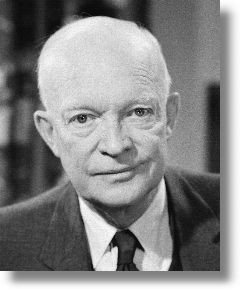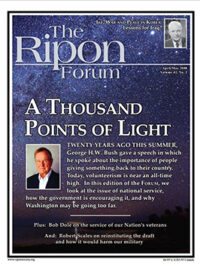On January 20, 2009, our new president will face difficult issues of war and peace similar to those that confronted a popular predecessor whose name has hardly been mentioned during the current campaign.
 Like President Dwight D. Eisenhower 56 years earlier, the next chief executive will have to deal with a prolonged and divisive war inherited from the preceding administration. Eisenhower made his decisions about the Korean War, a conflict that started when North Korean forces invaded South Korea in June 1950 and that within a year became a bloody stalemate. By the time Eisenhower took office in January1953, the American people were weary of the deadlocked fighting and stalled peace talks, yet they also wanted an honorable settlement. Just six months after he became president, Eisenhower achieved one, which preserved South Korean security and allowed U.S. troops to begin coming home.
Like President Dwight D. Eisenhower 56 years earlier, the next chief executive will have to deal with a prolonged and divisive war inherited from the preceding administration. Eisenhower made his decisions about the Korean War, a conflict that started when North Korean forces invaded South Korea in June 1950 and that within a year became a bloody stalemate. By the time Eisenhower took office in January1953, the American people were weary of the deadlocked fighting and stalled peace talks, yet they also wanted an honorable settlement. Just six months after he became president, Eisenhower achieved one, which preserved South Korean security and allowed U.S. troops to begin coming home.
The differences between the Korean and Iraq wars could hardly be greater. Korea began as a defensive war for the United States, fought to protect the South Korean government it supported and sustained. The Iraq War started when U.S. forces launched a preventive strike to topple the regime of an odious dictator who had reputedly obtained weapons of mass destruction. In Korea, U.S. troops fought mainly a conventional war against the armies of North Korea and the People’s Republic of China. In Iraq, Americans have waged a war of shifting strategies to suppress insurgents, militias, and terrorists. The resolution of the war in Iraq will be very different than the settlement in Korea. Yet it is still instructive to recall how Eisenhower made decisions about Korea, since the next president, like Eisenhower, will have to make hard choices about the global consequences of a limited war.
In 1952, so many Americans “liked Ike” that he won a landslide victory in the presidential election. They also trusted Ike to make the right decisions that would break the deadlock in Korea, a confusing war in which U.S. objectives had changed from “police action” to liberation to containment while Harry S. Truman was commander-in-chief. On the campaign trail, Eisenhower avoided specifics about what he might do in Korea. His most important statement occurred just ten days before the election when he declared, “I shall go to Korea.” This promise reassured voters that one of the greatest generals in American history would make a first-hand assessment of the war. Eisenhower fulfilled his pledge a month later, yet he began his presidency without a plan to end the war.
Before long, however, Eisenhower’s aides sent signals that the president was prepared to escalate the war if the Chinese and North Koreans did not accept American terms for an armistice. The main issue that had prevented an armistice almost since the peace talks began in 1951 was U.S. insistence on voluntary repatriation so that no prisoner of war would be forced to return to Communist rule.

Yet even as he seemed ready to authorize stronger military action that might lengthen or widen the war, Eisenhower hoped for a settlement that would strengthen the United States in its global, Cold War struggle against communism. Eisenhower was a shrewd strategist who knew that U.S. success in the Cold War required a careful calibration of ends and means that preserved a winning asset – the formidable power of the American economy. Lengthy, indecisive conflicts in places that Communist adversaries chose only drained American strength to the detriment of that larger global struggle. As Eisenhower explained in his First State of the Union message in February 1953, “To amass military power without regard to our economic capacity would be to defend ourselves against one kind of disaster by inviting another.”
Eisenhower got some unexpected help in his efforts to break the deadlock in the Korean armistice negotiations. On March 5, 1953, the Soviet dictator, Josef Stalin, died. Stalin had urged his North Korean clients to continue fighting despite their war weariness. Stalin’s successors sent a different message, as they realized that a relaxation of tensions with the United States and its allies was essential if they were to have any hope of overcoming the intractable economic problems of their Communist system. The change in Soviet policy encouraged the North Koreans and the Chinese, both of whom had absorbed enormous losses and understood the power of the United States and its allies to inflict more, to accept the establishment of a commission with members from five neutral nations to determine whether individual POWS would be repatriated. The fighting in Korea finally stopped when negotiators at Panmunjom signed an armistice on July 27, 1953.
Eisenhower counted the Korean armistice as one of his greatest successes, and in the months that followed the president and his aides completed a sweeping reassessment of U.S. national security policy. On October 30, Eisenhower approved his administration’s basic Cold War strategy, popularly known as the “New Look.” He authorized greater reliance on nuclear weapons as well as on strengthened alliances and covert operations to prevent the kind of aggression that had led to war in Korea and to protect the United States and its allies against global dangers. The New Look rested on one of the president’s fundamental principles: “A strong, healthy, and expanding economy is essential to the security and stability of the free world.” This strategy protected the United States and its allies during the rest of Eisenhower’s presidency, and no American died in combat during that time. No wonder so many people still remember the Eisenhower years as an era of peace and prosperity.
Eisenhower was a shrewd strategist who knew that U.S. success in the Cold War required a careful calibration of ends and means that preserved a winning asset- the formidable power of the American economy.
Eisenhower’s experience in ending the Korean War suggests no obvious, much less easy solutions to the war in Iraq. There are no current negotiations, like those more than 50 years ago in Korea, that will facilitate a U.S. exit from Iraq. What will determine how many U.S. troops are engaged in Iraq and how long they remain there will be strength of the insurgency, the capability of Iraqi forces to maintain internal order, and the effectiveness of the Iraqi government in overcoming sectarian and ethnic divisions and in providing basic services. Even more important may be the patience of the American people and whether they believe the continued sacrifices of this war, human and material, are producing sufficient progress in Iraq and gains for U.S. security.
The next president, like Eisenhower, will need a broad and keen strategic vision. Just as Ike balanced the war in Korea against the demands of global security, the new chief executive will have to weigh the costs and benefits of the conflict in Iraq in the continuing war on terrorism. Success in that worldwide struggle will require, as Eisenhower said during the Cold War, a vibrant, expanding American economy. The dangers to the economy are even greater than they were a half century ago, since the costs of the current war – by some estimates more than $3 trillion – already are staggering. We can only hope that the next president will recall Ike’s leadership during perilous times in Korea and will strive for similar success.
Chester Pach is a member of the Department of History at Ohio University. He is the author of The Presidency of Dwight D. Eisenhower, rev. ed., and is writing a history of the presidency of Ronald Reagan.




